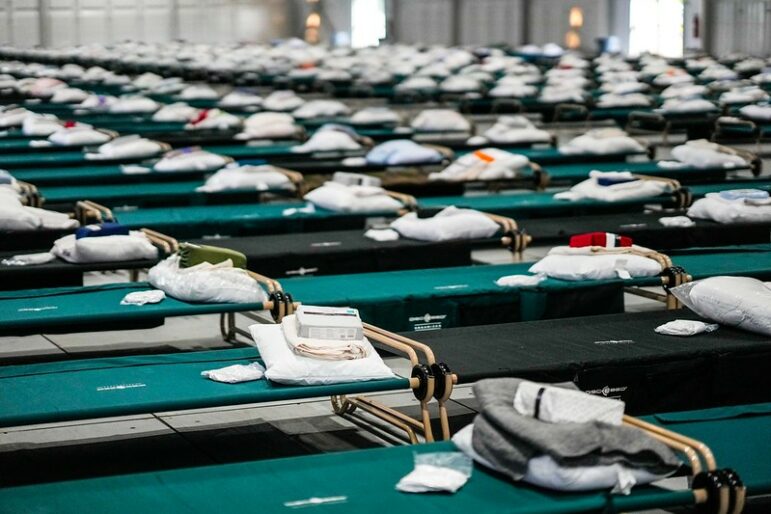A bill introduced in the City Council would establish “minimum standards” for HERRCs and respite centers that the city would have to meet, including that beds be at least three feet apart and that facilities have a certain number of bathrooms and showers per person.

Michael Appleton/Mayoral Photography Office
Cots lined up in a Humanitarian Emergency Response and Relief Center (HERRC) on Randall’s Island last year.
The Adams administration this week announced plans to open its 12th Humanitarian Emergency Response and Relief Center, or HERRC, the latest in the city’s sprawling network of new shelters to house asylum seekers, tens of thousands of whom have arrived from the southern border over the last year.
The site will be located on Third Avenue and 97th Street in Manhattan and is expected to shelter approximately 500 families with children. “New York City continues to do more than any other city or level of government to address this national crisis,” Adams said in a statement announcing the new site Tuesday, in which he once again implored the federal government for more aid to help the city keep up with demand.
The latest HERRC will join 11 others already operating and providing shelter to more than 12,000 immigrants, officials said during a City Council oversight hearing last week. Another 3,000 migrants were being housed at 11 “respite centers” intended for short-term stays, but where many asylum seekers have remained for weeks at a time and where resources and amenities are limited.
Concerns about conditions in the city’s expanding web of emergency shelters have intensified in recent weeks, since many of the sites operate outside the traditional Department of Homeless Services (DHS) system and “are not governed by the relevant state and city regulations and policies that apply to DHS shelter,” Kathryn Kliff, a staff attorney with the Legal Aid Society, said.
The legal nonprofit is one of the organizations in charge of oversight of New York’s “right to shelter” rules, under which the city is obligated to provide a bed to anyone who needs it and which sets minimum standards for DHS shelter facilities.
Mayor Eric Adams in May suspended some of those provisions, and later asked the courts for broader relief from the legal requirements in instances where the city “lacks the resources and capacity to establish and maintain sufficient shelter sites, staffing, and security to provide safe and appropriate shelter.” A court hearing on that request is expected for July 19, according to Legal Aid.
In the meantime, a bill introduced in the City Council last week, if passed, would establish “minimum standards” for HERRCs and respite centers that the city would have to meet, including that beds be at least three feet apart and that facilities have a certain number of bathrooms and showers per person.
While the Council said several HERRCs meet that criteria, respite centers are more likely to lack additional resources. One such location, for example—located at St. Margaret Mary’s Catholic Church in Queens—lacked showers, forcing asylum seekers staying there, some for a month at a time, to walk to bathing facilities in a nearby park, City Limits reported previously.
“The respite centers are supposed to be really just temporary facilities,” Zachary Iscol, commissioner of the Office of Emergency Management (OEM) told lawmakers at last week’s hearing, where he acknowledged that three of those sites “don’t have an ideal shower solution.”
The average length of stay at respite centers is two weeks, he said, though “there is no maximum amount of time,” that migrants can remain at the sites.
Most HERRCs, by contrast, are staffed with nurses, do referrals to mental health services, have staff to help immigrants access medical insurance and offer laundry services and lockers.
The OEM commissioner added that nurse practitioners stop by respite centers but did not specify how frequently, stating that asylum seekers are referred to the city’s “Arrival Center” at the Roosevelt Hotel in Manhattan for access to services.
Iscol said if the administration were obligated to provide laundromats, showers, lockers, and other amenities at each site, as the Council legislation requires, it would face challenges in opening sufficient shelters, potentially leaving migrants to sleep on the streets. He acknowledged that there should be standards for the facilities, but said they shouldn’t be legislated.
Councilwoman Shahana Hanif, who sponsored the bill, defended the legislation. “The administration called our bill to set standards for these centers ‘performative,’ but this bill is essential to protecting dignified housing,” she said.
As of June 21, there were 48,700 asylum seekers in the city’s care.
“We support the bill in order to ensure there are minimum standards to meet people’s basic needs,” Kliff said.








